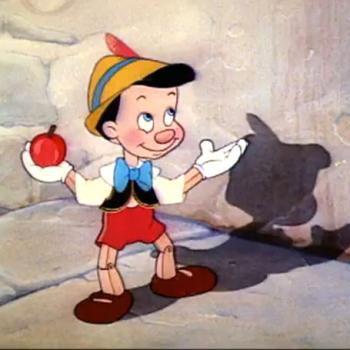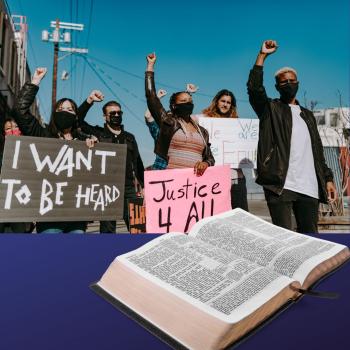 On Monday we will once again celebrate George Washington's birthday. (He was actually born on February 22, 1732.) Over the course of the last year I have spent a considerable amount of time thinking about Washington for my book on Christianity and the founding of the American republic. In a chapter entitled "Did Washington Pray at Valley Forge?" I explore his religious beliefs and wonder whether or not we can truly call him a Christian. Washington's faith is not easy to pin down.
On Monday we will once again celebrate George Washington's birthday. (He was actually born on February 22, 1732.) Over the course of the last year I have spent a considerable amount of time thinking about Washington for my book on Christianity and the founding of the American republic. In a chapter entitled "Did Washington Pray at Valley Forge?" I explore his religious beliefs and wonder whether or not we can truly call him a Christian. Washington's faith is not easy to pin down.
I am not the only one who has wondered whether or not Washington was a Christian. His contemporaries also wondered. Reverend Timothy Dwight, the president of Yale College and one of the leaders of the evangelical revival known as the Second Great Awakening, felt confident that Washington was a Christian, but he was also aware that "doubt may and will exist" about the substance of his faith.
Today, Washington's faith has become a minor battlefield in America's ongoing culture wars. Tim LaHaye, an evangelical minister and the coauthor of the best-selling Left Behind novels, has called Washington "a devout believer in Jesus Christ" who, in good evangelical fashion, "had accepted Him as His Lord and Savior." Peter Lillback, the current president of Westminster Theological Seminary in Philadelphia, has written over 1,100 pages in an attempt to prove that Washington was "an orthodox, Trinity-affirming believer in Jesus Christ . . ." In contrast, Joseph Ellis, a historian who won the Pulitzer Prize for his writing about the American founders, has described Washington as a "lukewarm Episcopalian." Writer Brooke Allen recently concluded that "there are very real doubts as to whether Washington was a Christian or even whether he was a believer at all."
Who is right? Or, more importantly, what is at stake in deciding who is right? In recent years Washington's faith has become heavily politicized. It is often used to promote a particular political platform in the present. The argument goes something like this: "If George Washington was a Christian, then America must be too" or "If Washington was not a Christian, then he must have desired the United States to be a secular nation."
Most historians agree that Washington was quiet about his faith. Unlike John Adams, Thomas Jefferson, or Benjamin Franklin, he did not leave behind definitive statements about what he believed. Neither was he particularly curious about theology or other religious matters. His religious reading was confined largely to sermons purchased by his devout wife, Martha.
We do know that Washington was a firm believer in what he called "Providence." He used this term 270 times in his writings, usually employing it as a synonym for the Judeo-Christian God. This was an omniscient, omnipotent, and loving God who created and ordered the universe, but whose purposes remained mysterious. Washington's God was active in the lives of human beings. He could perform miracles, answer prayer, and intervene in history to carry out his will. Yet Washington never tried to predict what God was doing in history. Instead, he acted in history—often with great valor and determination—and let God's purpose be done.
Washington was christened into the Anglican Church. His mother, Mary Ball Washington, was known in Virginia plantation circles for her piety. George's religious upbringing included regular reading of the Bible and the Book of Common Prayer. He attended Anglican (later Episcopal) churches most of his life and even served his Virginia parish in leadership roles.
He often referred to God with descriptive labels such as the "Governor of the Universe," "Providence," or the "Great Ruler of Events," but he never used the name "Jesus Christ" in his public or private writings. We know from eyewitness accounts that he was a man of prayer, but he rarely wrote about his inner devotional life.
Perhaps the most discussed aspect of Washington's religious behavior is his Communion habits. The Lord's Supper is a sacrament in which the partaker identifies personally and publicly with the death of Jesus Christ for the sins of the world. Washington's step-granddaughter, Nelly Custis Lewis, reported that Washington would often leave church after the minister's blessing and travel home with her, sending the carriage back for his wife, Martha, who stayed to receive the sacrament. Much of the evidence suggests that Washington had no real interest in Communion. While his lack of interest was actually quite normal by 18th-century standards (the number of churchgoers who did receive Communion was very low), it also raises serious questions about the quality of his faith.
We are on much firmer evidentiary ground when we discuss Washington's views on the relationship between religion and public life. Washington believed that Christianity was needed to help sustain a moral republic. In his famous Farewell Address of 1796, he wrote: "Of all the dispositions and habits which lead to political prosperity, religion and morality are indispensable supports." There is substantial evidence to suggest that Washington was willing to support any and all religious groups that he believed could contribute to the public good.





